#African-American descendants of enslaved Africans
Text
Whenever I hear other African Americans say they're not black but indigenous/aboriginal a part of me dies
#like you can't be pro black but then ashamed to call yourself#majority of african americans are descendants of slaves and that's ok#we don't all have to come from royal blood and we also don't have to be native to america#there is history books on the slave trade and how west africa was colonized#there is a difference from having the theory that black people were one of the first humans to exist and traveled to countries#which created the blue eye gene or light skin#but claiming to be native american or aboriginal when it's not in your dna or you're even a direct descendant of its just not accurate#because then that creates another issue where people are erasing another ethnic group#not to mention wearing regalia or items from just any tribe you can find is considered cultural appropriation#also there were native american tribes who enslaved black people so the logic just doesn't make sense#non blacks dni
1 note
·
View note
Text
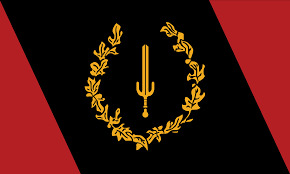
The Soulaani/Black American Heritage Flag
"Soulaan" means "people of soul". It is an homage to Southern African Americans, largely from where most African Americans descend.
Soulaan is a term used to describe Black people who descend from chattel enslavement in the United States. Other more familiar terms include African American, Afro-American, Black American, American Descendents of Slavery (ADOS), or Foundational Black American (FBA).
The Soulaan flag was designed by Melvin Charles and Gleason T Jackson in 1967 in response to the things that took place during the Civil Rights Movement.
It features a blunted sword in the center, surrounded by a wreath of figs. The blunted sword symbolizes pride and the ability to blunt the earth. The flag features red and black stripes. The black represents the pride of having Black pigmentation. The red represents the blood that Black women, men, and children have shed in the fight for freedom, equality, justice, and human dignity all across the globe. The gold represents prosperity, intellect, and peace.
While I just learned the term, I did know there was a Black American flag, used by those who aren't comfortable under the "official" American flag. Something to know!
218 notes
·
View notes
Photo


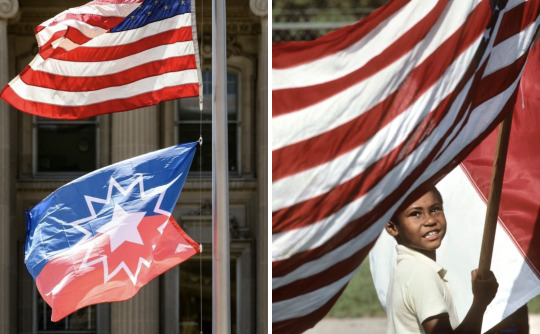


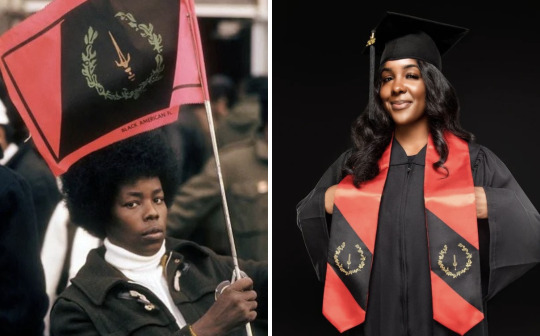
Juneteenth is a Black American holiday.
We call Juneteenth many things: Black Independence Day, Freedom Day, Emancipation Day, Jubilee Day. We celebrate and honor our ancestors.
December 31 is recognized as Watch Night or Freedom’s Eve in Black American churches because it marks the day our enslaved ancestors were awaiting news of their freedom going into 1863. On January 1, 1863, President Lincoln issued the Emancipation Proclamation. But all of the ancestors wouldn’t be freed until June 19, 1865 for those in Galveston, Texas and even January 23, 1866 for those in New Jersey (the last slave state). (It’s also worth noting that our people under the Choctaw and Chickasaw Nations wouldn’t be freed until April 28, 1866 and June 14, 1866 for those under the Cherokee Nation by way of the Treaties.)
Since 1866, Black Americans in Texas have been commemorating the emancipation of our people by way of reading the Emancipation Proclamation and coming together to have parades, free festivities, and later on pageants. Thereafter, it spread to select states as an annual day of commemoration of our people in our homeland.
Here’s a short silent video filmed during the 1925 Juneteenth celebration in Beaumont, Texas:
youtube
(It’s also worth noting that the Mascogos tribe in Coahuila, Mexico celebrate Juneteenth over there as well. Quick history lesson: A total of 305,326 Africans were shipped to the US to be enslaved alongside of American Indians who were already or would become enslaved as prisoners of war, as well as those who stayed behind refusing to leave and walk the Trail of Tears to Oklahoma. In the United States, you were either enslaved under the English territories, the Dutch, the French, the Spanish, or under the Nations of what would called the Five “Civilized” Native American Tribes: Cherokee, Creek (Muscogee), Chickasaw, Choctaw, and Seminoles. Mascogos descend from the Seminoles who escaped slavery during the Seminole Wars, or the Gullah Wars that lasted for more than 100 years if you will, and then settled at El Nacimiento in 1852.)
We largely wave our red, white and blue flags on Juneteenth. These are the only colors that represent Juneteenth. But sometimes you may see others wave our Black American Heritage flag (red, black, and gold).
Juneteenth is a day of respect. It has nothing to do with Africa, diversity, inclusion, immigration, your Pan-African flag, your cashapps, nor your commerce businesses. It is not a day of “what about” isms. It is not a day to tap into your inner colonizer and attempt to wipe out our existence. That is ethnocide and anti-Black American. If you can’t attend a Black American (centered) event that’s filled with education on the day, our music, our food and other centered activities because it’s not centered around yours…that is a you problem. Respect our day for what and whom it stands for in our homeland.
Juneteenth flag creator: “Boston Ben” Haith
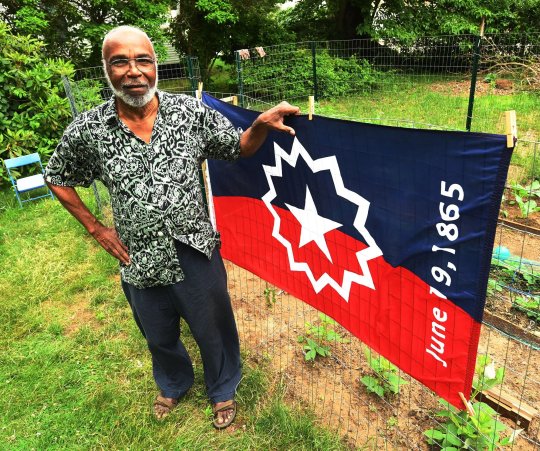
It was created in 1997. The red, white and blue colors represent the American flag. The five-point star represents the Lone State (Texas). The white burst around the star represents a nova, the beginning of a new star. The new beginning for Black Americans.
Black American Heritage Flag creators: Melvin Charles & Gleason T. Jackson

It was created in 1967, our Civil Rights era. The color black represents the ethnic pride for who we are. Red represents the blood shed for freedom, equality, justice and human dignity. Gold fig wreath represents intellect, prosperity, and peace. The sword represents the strength and authority exhibited by a Black culture that made many contributions to the world in mathematics, art, medicine, and physical science, heralding the contributions that Black Americans would make in these and other fields.
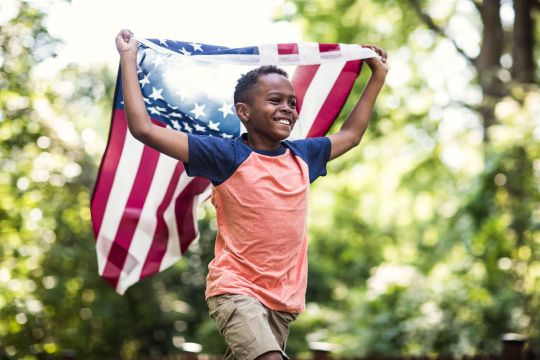
SN: While we’re talking about flags, I should note that Grace Wisher, a 13-year-old free Black girl from Baltimore helped stitched the Star Spangled flag, which would inspire the national anthem during her six years of service to Mary Pickersgill. I ain’t even gon hold you. I never looked too far into it, but she prob sewed that whole American flag her damn self. They love lying about history here until you start unearthing them old documents.
In conclusion, Juneteenth is a Black American holiday. Respect us and our ancestors.
#juneteenth#juneteenth flag#black american history#black american culture#ben haith#black american heritage flag#melvin charles#gleason t jackson#grace wisher#american flag#mascogos#juneteenth 2023
1K notes
·
View notes
Text
I saw an article in an Israeli leftist newspaper, which talked about a phenomenon nicknamed, "Blaxit." For those unfamiliar, it's a movement calling for Americans and Europeans of Black/African descent to move to Africa.
This is actually not a new idea (though according to the article, it has picked up some momentum since the George Floyd murder). The "Back to Africa" movement was based on the exact same idea, and was even successful in establishing a whole country for returning Africans, Liberia, as far back as 1847.
And here's the most ironic part: it's the EXACT same principle that drives Zionism. It's the notion that, "our ancestors were removed from our ancestral homeland a long time ago in order to be used as slaves by Europeans, and even though over time our people became free, we never became equal. We are tired of it, and even though we understand that our quality of life will drastically drop if we leave the places that thrived in part thanks to our people's labor over the years, especially as we leave them for the place we're originally from, which stagnated under the exploitative and oppressive influence of colonialism, we still prefer that hardship and sacrifice to a life of being second hand citizens (at best), of always being less than, of knowing our very right to live depends on the good will of the majority, made up of the descendants of those who enslaved our ancestors, a situation we can no longer bear."
I've never seen anyone chanting for the genocidal eradication of Liberia, or Sierra Leone (where 10% of the population is made up of the descendants of freed slaves from the US and Jamica), never heard anyone calling for the canceling of Maya Angelou because she returned to Africa by settling in Ghana, never heard anyone calling Ghana "an apartheid state" for giving returning Africans preferential treatment in immigrating there from 2019 on, or Sierra Leone for doing the same, I doubt anyone would call Africans adopting the Blaxit idea "colonizers" or "black supremacists." Yet all of that has been done to Jews and the Jewish State we've established in the Jewish ancestral homeland that our ancestors were removed from, when they were taken to be slaves across the Roman Empire. It's discriminatory in nature towards Jews, and it IS antisemitic.
#antisemitism#israel#israeli#israel news#israel under attack#terrorism#anti terrorism#hamas#antisemitic#antisemites#jews#jew#judaism#jumblr#frumblr#jewish#israel under fire#israelunderattack#blaxit#back to africa
305 notes
·
View notes
Text
by Dion J. Pierre
The University of Michigan’s Black Student Union (BSU) has resigned from the anti-Zionist student group Tahrir Coalition, citing “pervasive” anti-Black discrimination fostered by its mostly Arab and Middle Eastern leadership.
“Black identities, voices, and bodies are not valued in this coalition, and thus we must remove ourselves,” BSU said in a statement posted on Instagram. “The anti-Blackness within the coalition has been too pervasive to overcome, and we refuse to endure it.”
Proclaiming its continued support for the anti-Zionist movement, the group continued, “The BSU’s solidarity with the Palestinian people is unwavering, but the integrity of the Tahrir Coalition is deeply questionable. We refuse to subject ourselves and our community to the rampant anti-Blackness that festers within it. For this reason, we will no longer be a part of the Tahrir Coalition.”
BSU did not cite specific examples of the racism to which Black students were allegedly subjected, but its public denouncement of a group which has become the face of the pro-Hamas movement at the University of Michigan is significant given the history of cooperation between BSU and anti-Zionist groups on college campuses across the US.
BSU’s Black members are not, however, the first to openly clash with anti-Zionist Arabs.
When Arab and Palestinian anti-Zionist activists launched a barrage of racist attacks against African Americans on social media in August, Black TikTok influencers descended on the platform in droves to denounce the comments, with several announcing that they intended not only to remove Gaza-related content from their profiles but also to cease engaging in anti-Zionist activity entirely. The conversation escalated in subsequent posts, touching on the continuance of Black slavery in the Arab world and what young woman called “voracious racism” against African Americans.
“What’s even crazier is that earlier people were like, oh these are bots, no — this is how people really feel. And she made a video that’s a real human being that feels exactly that way,” one African American woman said. “These are people who feel like they are entitled to the support of Black people no matter what, that they get to push us around and tell us who the hell we get to vote for if we support them … They’ve lost their minds.”
An African American male said, “Why don’t we talk about the Arab slave trade? And keep in mind that the Arabs have enslaved more Black people than the Europeans combined.” Another African American woman accused Arabs of not denouncing slavery in Antebellum America.
#university of michigan#university of michigan's black student union#racist attacks#racist attacks against african americans#anti-zionists#arab anti-zionists#palestinian anti-zionists#tahrir coalition
55 notes
·
View notes
Text
(Spoilers for 'Babel' if u haven't read it yet and don't want those)
Hi I'm re-reading this book after my physical copy got delivered and I'm here to argue that Robin's fate is sealed the moment he chooses his name:

When Robin's mother dies, she says his name - his real name - one last time. It's only two syllables, but he'll never hear it again; Professor Lovell decides it's not worth keeping because the English tongue wouldn't be able to pronounce it. It's in this portion of the book that Kuang establishes one of the first instances of language as a means of wielding power: namely, the power to erase.
Even further, the scene where Robin chooses his 'English' name encapsulates his relationship to his identity for the rest of the book: he is simultaneously disconnected (or "un-anchored", as Kuang puts it on page 15) from his culture and 'othered' by it while living in English society, no matter how hard he tries to assimilate. Lovell makes Robin drop his own family's surname on page 12 (which we also never learn), effectively cutting him off from ever re-tracing his own ancestry and lineage. I think it's interesting to note that part of why Lovell doesn't value Robin's surname is because to the English, a name that isn't linked to status and capital is worthless.
What's even more interesting, though, is that Lovell doesn't let Robin take his last name, even after Robin realizes that he's his biological father. Instead, he forces Robin to choose a random English name. He tells him on page 10 that he has no family, and that his father is "unknown". Lovell wants Robin to remove all markers of his Asian identity from his name while simultaneously never claiming his son as his own despite his dependency on him.
This effectively places Robin in this odd liminal space where he is only allowed to participate in English society conditionally, but he also doesn't have the option to ever return to Canton because he no longer has the ability to fully reconnect there. His identity as a result morphs into this ambiguous thing that is constantly in flux relative to how white society perceives him. The choice to make him literally half white and half Asian as opposed to a fully Chinese man trying to assimilate makes this especially poignant; at no point does he have the ability to opt out of this constant state of limbo that the construct of racial identity puts him in. Robin - and perhaps Kuang did this intentionally - exists during a time when diasporic and mixed identities are still being formed and conceptualized, which means he wouldn't have much access to communities of people in similar situations. With the exception of Griffin, he's basically alone here.
It's during the scene where Robin first sets off on that ship to England that I'm reminded of what happened to the identity of enslaved Africans once they got through the Middle Passage: they and their descendants would never be able to fully re-integrate into their cultures of origin, but would also be permanently 'other' in the eyes of American society, relegating them to a constant state of place-lessness. An un-anchoring, if you will. (Obviously these are not the same, but a similar thing is happening in terms of cultural belonging and as an African American this is what came to mind. Please don't jump me 🤚🏾)
Let's circle back to the footnote on page 11 that quotes the book Robin took his name from: "I killed Cock Robin. Who saw him die?"
For the entirety of 'Babel', we see Robin struggle for the rest of his short life against the implications of his name and the circumstances that led to him choosing it, and none of it of his own volition. I think the most tragic part of Robin's story is that Lovell decided what he was supposed to be long before the book even begins. Robin's decision, then, to stray from that path renders him with (at least in his eyes) no other viable way to exist in this world in the state his father has left him in. Once he decides to stop participating in the imperialist machine, neither England nor Canton (which he has no way to return to after killing his father) has a place for him.
Long before he makes that final decision at the end of the book, Lovell subjects Robin to what I think can be interpreted as its own kind of death. He's become a ship permanently lost at sea with nothing left to anchor him and with no destination in sight. The other characters never really seem to fully understand the extent of the loss he has experienced because he is the only character other than Griffin who has been 'un-anchored' in such a specific way. Re-reading the book knowing what his fate will be, then, makes the rest of the story feel like a very slow, winding, and complicated march towards death.
TL; DR: Robin's been dead since the very beginning of 'Babel'. In fact, he's dead the very moment he becomes 'Robin', and Lovell killed him. But who saw him die?
#blabbering#long post#babel an arcane history#babel rf kuang#babel or the necessity of violence#the footnotes are themselves a part of the story if you really think about it#bookblr
88 notes
·
View notes
Text
Researchers found 11 new gravesites believed to be enslaved African Americans.
The graves are in Bull Run Regional Park next to the Atlantis Waterpark in Centerville in Fairfax County, Virginia.
Chrystal Gaskins is a descendant of families who used to live on the site. It used to be a plantation owned by Robert Carter III. Carter owned hundreds of slaves.
“Robert Carter III was one of the richest people in the American colonies at the time,” said Paul Gilbert, the Executive Director of NOVA Parks. “And he certainly knew George Washington and Thomas Jefferson and all the other founders. He actually believed when people said all people were created equal, that they were.”
Carter’s newfound Baptist faith seemed to change his views of slavery.
On January 1, 1791, seventy years before the Civil War, Carter signed a Deed of Gift which gradually freed his 500 enslaved individuals beginning with the oldest.
Gilbert said that was the largest emancipation prior to the Civil War.
“He [Carter] recognized his half-brother, who was enslaved, as his brother,” said Gilbert. “He had a religious awakening and created a church right here - one that was an integrated church in 1775.
He continued on his moral and spiritual journey, and in 1791 decided to emancipate slavery. It’s a very remarkable story that really should be in the history books everywhere. The story continued: one good deed led to many others. The state legislator that created the first HBCU grew up right here at Bull Run - was the grandson of one of those emancipated. Generations later, the Harris family who were descendants of the emancipated, donated the property that Atlantis Waterpark here at Bull Run is built on because they wanted an integrated pool. And they donated the land in 1963. 1963 was the height of the Civil Rights movement and they wanted an integrated pool. And NOVA Parks agreed to build one. We opened one a few years later that was integrated from day one. It's layers in history that all go back to this point and a really good deed that happened in 1791.”
Chystal’s family was among those freed by Carter.
“When they were free, they were given options to rent and later to purchase property,” said Gaskins. “And so our families had homes, they had farms. They ran businesses. They opened about 18 churches in Fairfax County, family cemeteries, so here is home.”
“My emotions coming through here are very spiritual,” added Gaskins. “They are very deep. There is a lot of emotion. The saddening part is we are here and we really don’t know who they are right now. That’s the sad part. But I won’t give up in my lifetime continuing to research somebody here that we know.”
“It's been an absolute joy to work with the descendants of the Harris family that have brought in their knowledge of the history of what happened here,” Gilbert added. “We have partnered very closely with the NAACP branch in Fairfax County.”
40 notes
·
View notes
Note
Hi Kiko,
I love your work, you are my favorite sim creator, you have the best hair styles for sims 4 people of color.
I wanted to know if you can make more long natural hair styles - (locs with clips/gold and silver) in different styles for the women in sims 4 :)?
like some long locs with long side bangs
some with clips
different ombre and color options
more edges
hidden scalp, or brown variation of scalps, (brown or black scalp)
I used the gif below to show a example hairstyle that looks different and cool.
-
Hair, clothes, and shoes is most important to me in sims 4.
Thank you for having this option to contact you,
Sincerely,
Nikki
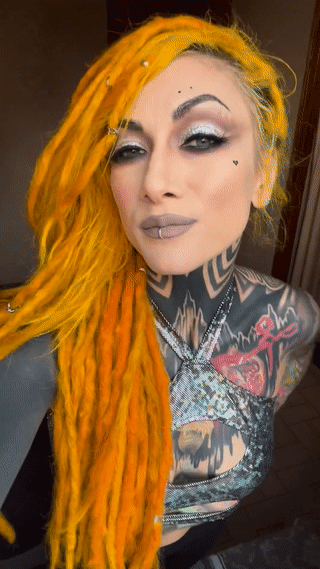
I appreciate your admiration towards my artwork but this is a very disrespectful thing to ask of me. I'm not sure if this is an innocent ask, I don't see how it is because I know you've heard black people ask other cultures to not appropriate our hairstyles but I could be wrong, if this is innocent below are my boundaries, and explanations on why I (Kiko Vanity; I'm not speaking for the whole black community) I'd like to not be asked things like this in the future.
my boundaries and why
I do not make hair for people of color. People of color is a broad way to say people who are not of White/European/Anglo-Saxon phenotypes. That means people of Asian, Hispanic/Latino, African, Mixed-Race, and Aboriginal descent; and I create CC for simmers who appreciate my artwork but mainly and ideally create CC HAIRS for simmers of African descent, (including mixed race if they also have African descent) because of the lack of black hairstyles in the initial release of the game in 2014, with that, these black simmers create sims that also reflect their environments and black upbringings. I make black content if you feel comfortable downloading my content you should be comfortable saying black. I want to stress black and not African-American (despite me being African American) because there are different ethnicities for each race, including black people.
2. I am not currently taking hair requests because I'd get too many at one time and that's not great for my mental health. To piggyback off the last sentence and statement 1, please do not request my cultural hairstyles using someone who doesn't respect our wishes. You may be asking yourself, "why is this an issue? hair is hair?" (look below)
During chattel slavery, every fiber of the enslaved Africans' lives was controlled by the narcissistic people who kidnapped them. including hair, being made to cover their hair, and calling them names & degrading them for their natural hair. As the years went by and slavery ended black people but more specifically black fem presenting people held the shame for their hair. Fast forward to today, even with all the turmoil the world is facing due to greed, classism, and the patriarchy) this is the first time in history that their descendants (me being one of them) can set boundaries and say what we are comfortable with and what we are not comfortable with. And to put this as bluntly as I can:
Do not send me videos/photos/gifs of people culturally appropriating in black people's hairstyles, it's anxiety-inducing.
I'd like to also say I'm not angry because I know there is an angry black person stereotype, this is simply uncomfortable and disheartening. I hope you can respect my wishes if not please feel free to block me.
Lastly,
You don't have to respect or do anything I am saying. You may do as you wish after reading this. Just if you are going to engage with me these are my boundaries.
99 notes
·
View notes
Text
Anderson Bonner
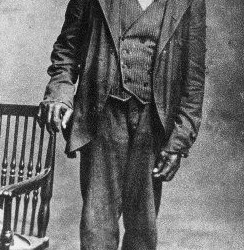
Prominent Texas landowner and businessman Anderson Bonner was born enslaved in Alabama around 1839. Not much is known about his younger years. Family history states that Bonner was given as a wedding present to the daughter of his former master, who moved him from Alabama to Arkansas. Anderson may have been “refugeed” in Texas during the Civil War when nearly 100,000 enslaved people from neighboring states were forcibly brought there by slaveholders to avoid the Union Army freeing them as it gradually occupied more of the Confederacy. If Bonner was in Texas by 1865, he—like other Lone Star state enslaved people—gained his freedom when Union General Gordon Granger and Union Troops under his command arrived in Galveston on June 19, 1865 and pronounced the end of slavery. That announcement became the basis for the Juneteenth holiday.
Sometime in 1865 Bonner married a woman known only as Eliza. Over time the couple had ten children, Anderson Jr, Newton, William, Ed, John, Andy, Mary, Martha, Charlie and Nash. Bonner arrived in Dallas, Texas, around 1870 with his brother Louis, and sister Caroline and they worked on a farm in the White Rock Creek area. Bonner by this time had acquired modest wealth. The 1870 Census lists his financial worth at $275 or approximately $5,456 in 2020 dollars. On August 10, 1874 Bonner purchased sixty acres of land, signing the deed with an “X”, as he never learned to read or write. He soon began leasing his land and the houses on it to cotton growing sharecroppers. With the money he earned, he bought more land. Bonner eventually amassed over two thousand acres of land in what is now North Dallas and the Dallas suburb of Richardson. The Medical City Dallas Hospital now sits on what was once the Bonner farm and the North Central Expressway divides Bonner’s original property.
Census records in 1900 reveal that six of the ten Bonner children still lived on the Bonner farm. Cotton, corn, and fruits were grown on the family farm worked mostly by Bonner, his children, and sharecroppers. Bonner’s sister, Caroline married into the Fields family, and one of her children married into the Giddings family, both prominent African American families of Dallas in the late 19th Century. In 1903, Eliza was killed in a oil lamp explosion in the family home. Sixty-four-year-old Bonner then married a woman named Lucinda, but the couple had no children.
Anderson Bonner passed away at the age of 82 in 1920. He was buried in White Rock Colored Union Cemetery (now White Rock Garden of Memories Cemetery), in Addison county. His descendants established the Anderson Bonner Endowment Scholarship that helps support Richardson Public School students who attend Prairie View A&M University. The first public school for black children in the North Dallas, the Vickery and Hillcrest school was renamed the Anderson Bonner School before its closing in 1955. The city of Dallas officially named the park west of Medical City Hospital, Anderson Bonner Park in 1976. The park consists of 44.1 acres of Bonner’s original land.
58 notes
·
View notes
Text
There is nothing in the world quite like a Gullah basket. Highly regarded and intricately stitched, each one showcases the maker’s artistry, as well as the centuries of skill passed down through Gullah families in South Carolina’s Lowcountry region.
This storied American craft dates back to the 1700s, and is a tradition rooted in West African culture. Enslaved rice farmers first brought the art form to South Carolina, and post-emancipation, it flourished as a method of expression. For more than eight generations, the Gullah community has continued the legacy,
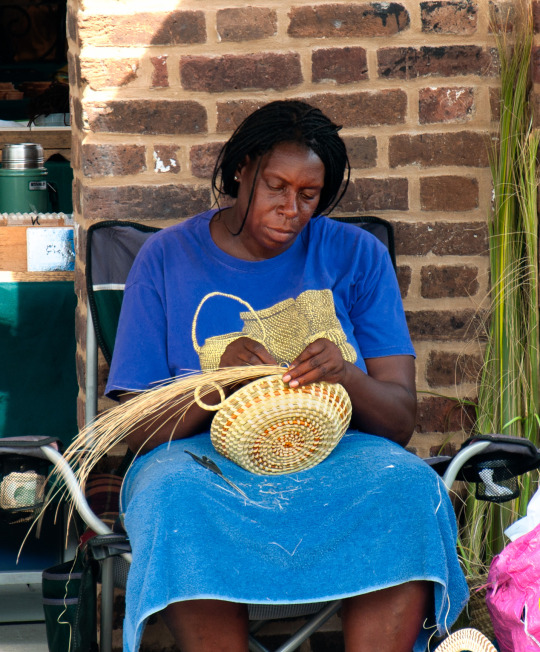
The art of sweetgrass basket weaving is practiced in coastal and barrier island communities from North Carolina to Florida, a region known as the Gullah-Geechee Cultural Heritage Corridor. The Gullah-Geechees are the descendants of enslaved West Africans who worked on coastal plantations. Because of their isolation, they were able to hold on to many traditions brought to these shores during the Transatlantic Slave Trade.
Visit Charleston or Beaufort, South Carolina, and you'll see people sitting on rural roadsides or in city parks and on street corners selling these beautiful baskets. In Georgia, you'll find basket weavers on Sapelo Island and on St. Simons Island, and in coastal communities like Riceboro, Darien and Harris Neck.
Each basket starts with a knot, and moistened grasses or pine needles are repeatedly coiled and wrapped with strips of palm frond stems. Some have lids, while others have handles and other ornate designs.
Today they are considered works of art. However, the Gullah-Geechee ancestors used baskets for more practical purposes -- for storing food, toting things like crops from the fields, and for fanning rice, flipping the grains into the air so that the husk could be carried away with the wind.
#braiding sweetgrass#baskets#black americans#crafts#art#homedesign#gullah#south carolina#southern#lowcountry#hoodoo#creative
531 notes
·
View notes
Text
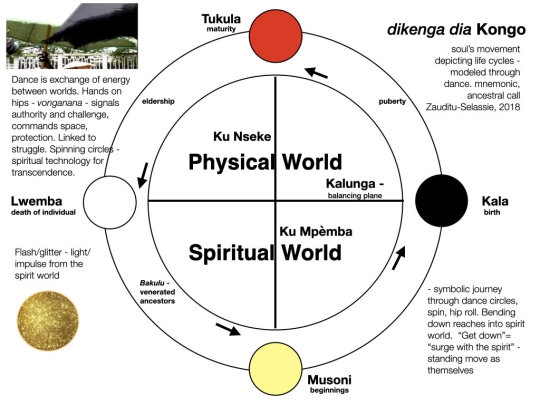
Archeologists also found the Kongo cosmogram on several plantations in the American South; they were Richmond Hill Plantation in Georgia, Frogmore Plantation in South Carolina, a plantation in Texas, and Magnolia Plantation in Louisiana. Historians call the locations where crossroad symbols were possibly found inside slave cabins and African-American living quarters as 'Crossroads Deposits.' Crossroads deposits were found underneath floor boards and in the northeast sections of cabins to conjure ancestral spirits for protection. Sacrificed animals and other charms were found where the crossroads symbols were drawn by enslaved African-Americans and four holes drilled into charms to symbolize the Bakongo cosmogram. Other West-Central African traditions found on plantations by historians is the use of six pointed stars as spiritual symbols. A six pointed star is a symbol in West Africa and in African-American spirituality.

On another plantation in Maryland archeologists unearthed artifacts that showed a blend of Central African and Christian spiritual practices among slaves. This was Ezekiel's Wheel in the bible that blended with the Central African Kongo cosmogram. This may explain the connection enslaved African Americans had with the Christian cross as it resembled their African symbol. The cosmogram represents the universe and how human souls travel in the spiritual realm after death entering into the ancestral realm and reincarnating back into the family. The artifacts uncovered at the James Brice House were Kongo cosmogram engravings drawn as crossroads (an X) inside the house. This was done to ward a place from a harsh slaveholder. Also, the Kongo cosmogram is evident in Hoodoo practice among African Americans. Archeologists unearthed on a former slave plantation in South Carolina clay bowls made by enslaved Africans that had the Kongo cosmogram engraved onto the clay bowls. These clay bowls were used by African Americans for ritual purposes.

The Ring shout in Hoodoo has its origins from the Kongo region from the Kongo cosmogram (Yowa Cross) and ring shouters dance in a counterclockwise direction that follows the pattern of the rising of the sun in the east and the setting of the sun in the west. The ring shout follows the cyclical nature of life represented in the Kongo cosmogram of birth, life, death, and rebirth. Through counterclockwise circle dancing, ring shouters built up spiritual energy that resulted in the communication with ancestral spirits, and led to spirit possession by the Holy Spirit or ancestral spirits.
Enslaved African Americans performed the counterclockwise circle dance until someone was pulled into the center of the ring by the spiritual vortex at the center. The spiritual vortex at the center of the ring shout was a sacred spiritual realm. The center of the ring shout is where the ancestors and the Holy Spirit reside at the center. The ring shout tradition continues in Georgia with the McIntosh County Shouters. At Cathead Creek in Georgia, archeologists found artifacts made by enslaved African Americans that linked to spiritual practices in West-Central Africa. Enslaved African Americans and their descendants after emancipation house spirits inside reflective materials and used reflective materials to transport the recently deceased to the spiritual realm. Broken glass on tombs reflects the other world. It is believed reflective materials are portals to the spirit world.
#bakongo#kongo#congo#cathead creek#mcintosh county#african american#west central africa#spiritual vortex#cross#cosomogram#yowa cross#cosmogram#african#afrakan#kemetic dreams#brownskin#africans#afrakans#african culture#afrakan spirituality#Ezekiel's Wheel#Magnolia Plantation
76 notes
·
View notes
Note
Hello! So, I'm black and I'm not usamerican, could you explain to me what exactly AAVE is? I just know it's like a dialect
I had to find a link bc it would take me far longer to try to organize my thoughts on this myself lol. I actually learned something new myself, as I'm not a linguistics master or anything like that.
Exploring Black Languages, a quick look at AAVE (African American Vernacular English)- Temi Oyenuga
AAVE + Its Origins
Black languages came out of the experience of enslaved African and their descendents in the Diaspora.
West Africans – who were enslaved in the Americas – were forced to understand English on plantations. Newly enslaved West Africans would have limited access to learn to speak English and there were laws in place that forbade them from being taught to read English. There were also policies and laws in place, which ensured that enslaved Africans were not allowed to speak in their mother tongue.
The roots of this African American language further lie in the resistance to the above oppression.
The resistance movement is where enslaved African American created a coded way in which they spoke that relied on the grammatical understanding they had from Africa. It also relied on other techniques like using negative words to describe positive things so the white slave owners would not be able to understand them when they spoke to each other. Thus, AAVE was a speech created as a communication system by Black people unintelligible to speakers of the dominant white class.
The shared Black experience has resulted in common language practices in the African Diaspora. AAVE is just one of many examples of this.
Coded Resistance: Freedom Fighting and Communication - for more explanation on how it's not just AAVE that was part of "creating a language" meant for only us to understand.
Language Jones- What is AAVE?
#its interesting how things i just take for granted as language are this complex#creatingblackcharacters#aave#black history
112 notes
·
View notes
Text
Katharine Birbalsingh: The first point is that everyone had slaves. Okay, people of all colors became slaves. For economic reasons, because of war. Because slavery, as odious as it was, was simply a normal way of life.
Arabs were extracting millions of black African slaves centuries before Christian nations did, for about 13 centuries, compared to the three centuries European nations ran the Atlantic slave trade. Arabs marched African slaves across the Sahara Desert, and as such, they died more often. It was customary to castrate them and many died from this practice. The Arabs also enslaved over 1 million white European Christians.
The term slavery in fact comes from the word Slav. The Slavs inhabited Eastern Europe and were taken by the Muslims of Spain in the ninth century. Not to mention that Africans have been enslaving each other for thousands of years.
The second point is that slavery was not about race, and it's important. It was not about race. The only reason we think it's about race is because philosophers like David Hume in the 18th century ranked human beings and put Africans at the bottom, saying that they had no souls. The Enlightenment imposed the concept of race on a practice that had been going on for centuries in order to justify that practice. And why did they have to justify it? And this is the point. Because people in the West began to question slavery's moral validity.
The fact is the people of all colors owned slaves. Both as part of the Atlantic slave trade and outside of it. In the United States and Caribbean, black people - black people - owned thousands of black slaves. And so did the Native Americans. Nearly 20,000 of the Native Americans Five Civilized tribes sided with the Confederacy during the Civil War fighting to keep slavery alive. 28% the black population who were free in New Orleans pledged their support to the Confederacy. All of the 13 southern states of the Confederacy had substantial numbers of black slave owners. There were more than 250,000 free blacks and nearly 4,000 of them were slave masters who owned more than 20,000 slaves.
The practice of slavery was legal after all. We need to remember that governments did not own slaves. Slave owners did. In fact, the US government fought a war to end slavery. How much should the descendants of the 400,000 Union soldiers, who lost their lives fighting to free the slaves, pay to the descendants of the slaves they freed?
Giving people lump sums of money does not work. Economists often point the Georgia Land Lottery of 1832, in which parcels of land were distributed randomly. What happened to the descendants of those who were lucky enough to be given this land? Are they the richest families in Georgia? No. In fact, within one generation after the distribution of the Georgia land, one could not distinguish between those who had been given land and those who hadn't.
Certainly my own direct experiences of working for 20-plus years in the inner city with families on welfare demonstrates this time and time again. Rather than give a man a fish, it is always better to teach him how to fish. All giving the fish does is make the giver feel better.
Reparations might relieve white people of their guilt, but it will do little else.
So back to my initial question. Why are we only discussing whether the West should pay reparations for slavery? Because while slavery was common to all civilizations, only one civilization developed a moral revulsion against it, very late in its history. Western civilization. Not even the leading moralists in other civilizations rejected slavery at all.
Rather than be ashamed as Westerners we should stand proud for having led the world out of a mentality where slavery was the norm, and we should vote against this motion.
[ Full debate: https://youtu.be/HboI2t5_M4I ]
==
No one ever talks about "reparations" from Arabs. The reasons are both multiple and obvious.
#Katharine Birbalsingh#slavery#reparations#western civilization#history of slavery#arab slave trade#islamic slavery#islamic slave trade#religion is a mental illness
26 notes
·
View notes
Text
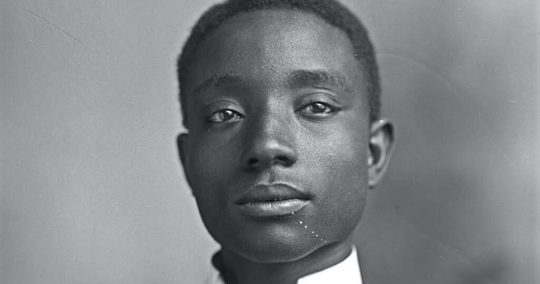
Freedmen Seek Their Fair Share of Billions of Dollars in Federal Aid and Why We Should Care/Rise UP and Support Them
By Eli Grayson
Eagle Guest Writer
Eli Grayson is a Creek Citizen and unabashed supporter of the Freedmen descendants of the 5 Civilized Tribes and the 1866 Reconstruction Treaties.
This past week, we celebrated our Nation’s 244th year of Independence with family and friends over BBQ and fireworks, we should all stop to reflect on its significance, particularly in light of the Black Lives Matter (BLM) movement.
The protests that have swept the country by those outraged over the death of George Floyd, Breonna Taylor, Ahmaud Arbery, and far too many others, most of whose names have not garnered national attention, has sparked a long-overdue National dialogue about the treatment of Black Americans in the United States, a reckoning with this country’s past, the many vestiges of slavery that continue today, and what we as a country can and must do to address racism. [It also reminds ALL of us that we have a long way to go.]
Not only have the egregious deaths of George Floyd, Breonna Taylor, and Ahmaud Arbery led to a growing chorus of voices calling for criminal justice reform, it has prompted many to reflect upon racism in both its subtle and overt forms today. It has prompted many to learn about events long celebrated by Black Americans such as Juneteenth (even the NFL recently recognized Juneteenth as an official holiday). And it has prompted many to consider what steps we as individuals, and as a society, can take to affirmatively address it. Here in Oklahoma, attention has focused on Black Wall Street and the 1921 Tulsa Race Massacre.
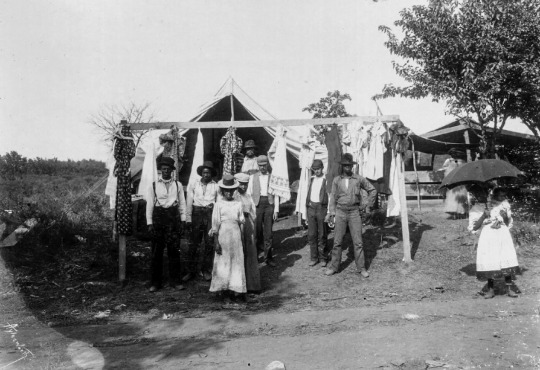
Well known is the U.S. Government’s abhorrent treatment of Native Americans, which included abrogation of countless treaties, appropriation of land, and forced removal to Western territories, including what is today Oklahoma.
Less well known, however, is the fact that the Cherokee, Chickasaw, Choctaw, Muscogee (Creek) and Seminole Nations – collectively known today as the Five Civilized Tribes – enslaved Africans. Like Southern plantation owners, they bought and sold slaves and treated them as chattel property. Indeed, slaveholding was such an integral part of the daily life of these tribal nations that each entered treaties with the Confederate States of America in 1861 to ensure its continuance.
Many Americans recently learned for the first time about the meaning and significance of Juneteenth, when nearly all remaining slaves in the United States and its territories were freed – a full 71 days after Confederate General Robert E. Lee surrendered at Appomattox on April 9, 1865 to Union forces led by General Ulysses S. Grant.
Enslaved Africans of Indian Territory
This was not the case for the enslaved Africans of Indian Territory. Even after Lee’s surrender, and even after General Granger read his Orders, the enslaved Africans of Indian Territory were kept in bondage.
Sadly, it was not until the Five Tribes of Indian Territory entered Treaties with the U.S. Government on March 21, with the Seminole Nation, on April 28, with the Chickasaw and Choctaw Nations, on June 14, with the Muscogee (Creek) Nation and on July 19, with the Cherokee Nation in 1866 – more than a year after Lee’s surrender – were these slaves granted freedom, tribal citizenship, and equal interest in the soil and national funds.
Each of these treaties (collectively known as the Treaties of 1866) contained provisions freeing the slaves and an express acknowledgement that the U.S. Constitution was, and shall remain, the Supreme Law of the land. Notably, there was no mention of tribal law or sovereignty insulating these slave holding tribes from full compliance with the U.S. Constitution, which includes all the Civil War reconstruction amendments.
Today, we find ourselves at a turning point in society. Similar to the country as a whole, the Cherokee, Chickasaw, Choctaw, Muscogee (Creek), and Seminole Nations must take this seminal moment to carefully examine their slaveholding past, their prior allegiance with the Confederacy, enshrined through Treaties entered in 1861, and how they can make amends by fully adhering to both the letter and spirit of the 1866 Reconstruction Peace Treaties.
Congressional legislation
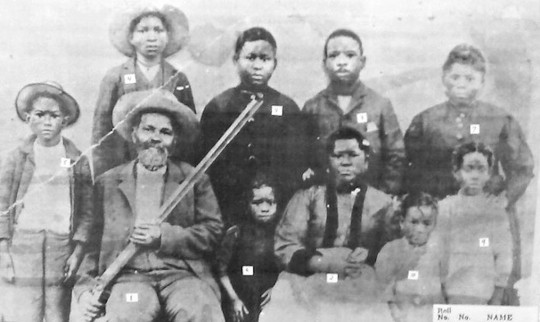
The three House bills are H.R. 2, the Invest in America Act, which includes $1 billion for the Native American Housing Block Grant Program to create or rehabilitate over 8,000 affordable homes for Native Americans on tribal lands; H.R. 6800, the HEROES Act, which includes $6 billion for housing and community development to respond to the Coronavirus; and H.R. 5319, the Native American Housing and Self-Determination Reauthorization Act (NAHASDA), which would authorize $680 million in grants to tribes in the first year and grow to $824 million in the fifth and final year.
Why is this important and why should you care? NAHASDA was originally passed by Congress in 1996 to address poor housing conditions in Indian country and last re-authorized in 2008. It is a flagship Federal law for Native American tribes and the vehicle through which approximately $650 million flows annually to the tribes. In Oklahoma, the Five Civilized Tribes receive more than $62 million annually in direct grants for housing and community development projects. These grants are based on a formula that takes into account various factors including the number of tribal members. Notably, these grants are supported by taxpayers.
For the 2021 Fiscal Year, the U.S. Department of Housing and Urban Development (HUD), which is responsible for administering NAHASDA, has informed the Five Civilized Tribes that they can expect to receive $62,223,462. Thus, nearly 10 percent of all NAHASDA grant funds will go to just these five tribes. By any measure, this is a significant sum, particularly when you consider that there are approximately 573 federally recognized tribes in the United States today, according to data from the federal Bureau of Indian Affairs. And, the final amount will be even greater as Congress has (appropriately) increased the amount of funds for NAHASDA far above the amounts requested by this Administration, including an appropriation of $825 million for this Fiscal Year.
Oklahoma Tribes receive millions in housing aid
Native American Tribes also receive other competitively awarded grants from HUD through a program known as the Indian Community Development Block Grant program. The Choctaw Nation was recently awarded $900,000 to rehabilitate 60 single-family homes while the Cherokee Nation received the same sum to construct a community building, which will house the Early Head Start program. The Chickasaw Nation was awarded $900,000 to construct a youth center in Ardmore, Oklahoma that will provide a safe and clean place for activities and services for Chickasaw tribal youth while the Muscogee (Creek) Nation will use its $900,000 award to construct a facility on the campus of the College of Muscogee Nation. The facility will include space for exhibitions and a lecture hall. These are worthy projects and it is vital that all those in need, including Freedmen descendants, can benefit.
Why Freedmen are concerned
Now if you have read this far, you must be thinking this is great news for these five tribes. And indeed, it is. However, for the Freedmen who are de facto members of the tribe, they may never see a dime of these funds if history is any guide.
Steps such as conditioning or denying the issuance of Citizenship Cards to Freedmen descendants, as well the disenrollment of Freedmen as tribal citizens, is what first led Congress in 2008 to include language in the NAHASDA re-authorization bill to link the receipt of NAHASDA housing grants to compliance with the treaty rights and benefits conferred on the Freedmen through the 1866 treaties.
That is why the efforts of House Financial Services Committee Chairwoman Maxine Waters, D-California, to fight on behalf of the Freedmen of all Five Civilized Tribes is so vital.
The committee she chairs oversees HUD and is responsible for periodically re-authorizing NAHASDA. A bi-partisan bill introduced in Congress last December would re-authorize NAHASDA. However, unlike the 2008 legislation, which contained language to prevent the Cherokee Nation from denying Cherokee Freedmen under the Act, the bill introduced by Rep. Denny Heck and co-sponsored by Reps. Scott Tipton (R-Colorado), Ben Ray Lujan (D-New Mexico), Tom Cole (R-Oklahoma), Deb Haaland (D- New Mexico), Don Young (R-Arkansas), Rep. Gwen Moore (D-Wisconsin), and Rep. Tulsi Gabbard (D-Hawaii), does not contain any protections for the Cherokee Freedmen nor the Freedmen of the other Civilized Tribes. Similarly, the version introduced in the Senate last week is devoid of such protections for the Freedmen.
Disturbed by the pattern of denying benefits to Freedmen, Chairwoman Waters is seeking assurance that descendants of Freedmen are not denied NAHASDA funds received by the Tribes. The Descendants of the Freedmen of the Five Civilized Tribes have been working to include language that would ensure that the Freedmen of all Five Civilized Tribes receive taxpayer funded NAHASDA benefits. A similar effort advanced by former House Financial Services Committee Chairman Barney Frank was successful and helped to ensure that Cherokee Freedmen received NAHASDA benefits. And in case, any question whether such protections were needed, one look only to the fact that HUD held up NAHASDA funds to the Cherokee Nation for noncompliance.
Native Americans keep fight against Freedmen
Given the harsh treatment of Native Americans at the hands of whites, one naturally would expect these Five Tribes and their supporters and defenders to be more sensitive to the plight of Freedmen who today make up more than 200,000 descendants.
The reality has been quite the opposite.
Despite knowing all this, tribal leaders and their supporters and defenders continue to maintain that such language is not needed and further argue that such language infringes upon the sovereign rights of ALL Native American tribes.
Both arguments could not be further from the truth.
Language ensuring that the Freedmen have access to federal housing benefits is urgently needed for the very reason that Freedmen have routinely been denied NAHASDA benefits for years. And let’s be clear – language we are seeking does not apply to ALL tribes, but rather only to the Freedmen of the Five Civilized Tribes.
And it does not stop at NAHASDA benefits. Freedmen have been denied tribal citizenship, benefits, and the right to vote as well. Regarding sovereignty, these are federal taxpayer dollars – as such, the federal government and, by extension, its American citizens, have a vested interest in ensuring that all tribal members, including Freedmen, benefit from the funds appropriated pursuant to NAHASDA.
If tribes feel so strongly about their sovereign right to continue to discriminate against Freedmen through denial of federally funded benefits, they can opt to refuse the funding, which would then be redistributed to other tribes. Indeed, it is the height of hypocrisy for any of the Five Civilized Tribes or their supporters to makes these arguments as they count the Freedmen when it comes to the allocation of federal housing grants from HUD yet turn around and deny those very same Freedmen from receiving such benefits.
Freedmen are equal, lawful Tribal citizens
And don’t be mistaken. While Freedmen should be treated as equal citizens under the respective 1866 Treaties, the language we are seeking to include in each of these three bills carefully avoids this ensuring Freedmen receive taxpayer housing and community development benefits on the same terms and conditions as their Native American sisters and brothers.
Indeed, in many instances, these truly are their sisters and brothers given the extensive intermixing of Freedmen and By Blood tribal members over the years. Ironically, this has resulted in some members of a family being considered by the Five Tribes as Indian and therefore citizens of the Tribe while other family members being considered by the tribe as non-Indian and therefore like black sheep.
Yet every time we make a further legislative concession and are led to believe that we are close to a final agreement on language, the Tribes and their supporters and defenders move the goalposts. Sound familiar? Yes, a sensitive issue. The Freedmen only seek to ensure that the Five Civilized Tribes comply with the Treaties of 1866.
Tribal Nations’ actions throw shade on BLM
Lastly, the Five Civilized tribes cannot have it both ways. They cannot on the one hand claim they are victims of discrimination and participate in BLM rallies yet discriminate against Freedmen by denying them suffrage and other rights of tribal citizenship under the guise of sovereignty.
And we are under no illusion that fighting this battle for justice and equality will not remain a challenge. The Five Civilized Tribes have wielded their extensive influence amongst the Nation’s 573 tribes to frame the debate and shape the position of the National tribal organizations in Washington, whom the Members of Congress look to when writing laws that affect the tribes. Adding to the challenge is the fact that the Five Civilized tribes have deployed their sizable resources to contribute to key Members of Congress with the dual purpose of keeping Americans in the dark about their slaveholding past and ensuring that these legal protections for Freedmen never see the light of day in Congress.
But just like our Nation, it is time for the Five Civilized Tribes to stand up and confront their past by taking immediate and affirmative steps to ensure that all descendants of Freedmen receive the federal housing benefits.
This they can do by supporting legislation being courageously advanced by Chairwoman Waters that would require the Five Civilized Tribes to both comply with their Treaty obligations of ensuring access to benefits for Freedmen and report on their compliance to Congress.
Featured Image (Top), Buck C. Franklin, Nashville, Tennessee, 1899, Calvert Brothers Studio Glass Plate Negatives Collection, The Tennessee State Library and Archives Blog
#Black Lives Matter for Freedmen Descendants of the Five Civilized Tribes#Black American Freedmen#Freedmen#indians#slavery
107 notes
·
View notes
Text
by Dion J. Pierre
Anti-Zionist activists recently launched a barrage of racist attacks against African Americans on social media, triggering an exchange of insults as well as arguments over the Arab world’s role in enslaving Black Africans.
“Black people also wear a uniform and get on a plane and come to our countries and kill us!” one influencer said in a compilation of TikTok posts shared by pro-Israel activist Hen Mazzig. “You vote the same f—king melanated f—king people to government that sign papers to kill us. I don’t want to hear it anymore!”
“Keep Palestinians names out of your f—king mouths when you’re trying to defend your decision for voting for Kamala,” another said, referring to Democratic presidential nominee Kamala Harris, who is Black.
TikTok user “Dan1ahan” charged that Black Americans “switched up 180 on Palestinians and people who are Palestinian activists the second we have a Black woman running for office,” describing the alleged betrayal as “disgusting.” Touching on the upcoming US presidential election, one Arab woman said all Black people want is a “token ethnic president” in office.
Black TikTok influencers descended on the platform in droves to denounce the comments, with several announcing that they intended not only to remove Gaza-related content from their profiles but also to cease engaging in anti-Zionist activity entirely. The conversation escalated in subsequent posts, touching on the continuance of Black slavery in the Arab world and what young woman called “voracious racism” against African Americans.
“What’s even crazier is that earlier people were like, oh these are bots, no — this is how people really feel. And she made a video that’s a real human being that feels exactly that way,” an African American woman said. “These are people who feel like they are entitled to the support of Black people no matter what, that they get to push us around and tell us who the hell we get to vote for if we support them … They’ve lost their minds.”
An African American male said, “Why don’t we talk about the Arab slave trade? And keep in mind that the Arabs have enslaved more Black people than the Europeans combined.” Another African American woman accused Arabs of not denouncing slavery in Antebellum America.
“We spend our money with you,” she said. “We stand in solidarity with you, and you keep asking for more, and more, and more, and it’s never enough.”
This is not the first time that anti-Zionists have hurled racist abuse and expletives at Black Americans while denigrating their accomplishments and status as full citizens of the United States.
29 notes
·
View notes
Text
This is the best thing I’ve read yet on the mass bombing of Gaza and on the oppression of the Palestinians. I’ve always had great respect for Ta-Nehisi Coates, and this is just magnificent:
Some excerpts:
And it became very, very clear to me what was going on there. And I have to say it was quite familiar. Again, I was in a territory where your mobility is inhibited, where your voting rights are inhibited, where your right to the water is inhibited, where your right to housing is inhibited. And it’s all inhibited based on ethnicity. And that sounded extremely, extremely familiar to me.
And so, the most shocking thing about my time over there [in the West Bank] was how uncomplicated it actually is. Now, I’m not saying the details of it are not complicated. History is always complicated. Present events are always complicated. But the way this is reported in the Western media is as though one needs a Ph.D. in Middle Eastern studies to understand the basic morality of holding a people in a situation in which they don’t have basic rights, including the right that we treasure most, the franchise, the right to vote, and then declaring that state a democracy. It’s actually not that hard to understand. It’s actually quite familiar to those of us with a familiarity to African American history.
And on Gaza:
…this is like really personal for me, because I came up in a time and in a place where I did not really understand the ethic of nonviolence. And by “ethic,” I mean the notion that violence itself is corrupting, that it corrupts the soul. And I didn’t quite understand that. If I’m truly honest with you, as much as I saw my relationship with the Palestinian people and as much as it was clear what the relationship was, it was at the same time clear that there was some sort of relationship with the Israeli people, too. And it wasn’t one that I particularly enjoyed, because I understood the rage that comes when you have a history of oppression. I understood the anger. I understood the sense of humiliation that comes when people subject you to just manifold oppression, to genocide, and people look away from that. I come from the descendants of 250 years of enslavement. I come from a people who sexual violence and rape is marked in our very bones and in our DNA. And I understand how when you feel that the world has turned its back on you, how you can then turn your back on the ethics of the world. But I also understood how corrupting that can be.
I was listening, actually, to my congressman last night, or I guess it was two nights ago, talk on the news. And a journalist asked him, “How many children, how many people must be killed to justify this operation? Is there an upper limit for the number of people that could be killed, when you would say, 'This is just too much. This just doesn't — this just doesn’t, you know, compute. This does not add up’?” And I will tell you, that congressman couldn’t give a number. And I thought, “That man has been corrupted. That man has lost himself. He’s lost himself in humiliation. He’s lost himself in vengeance. He has lost himself in violence.”
I keep hearing this term repeated over and over again: “the right to self-defense.” What about the right to dignity? What about the right to morality? What about the right to be able to sleep at night? Because what I know is, if I was complicit — and I am complicit — in dropping bombs on children, in dropping bombs on refugee camps, no matter who’s there, it would give me trouble sleeping at night. And I worry for the souls of people who can do this and can sleep at night.
And on Biden’s response to Gaza:
I mean, I think hearing President Biden himself — and here I will personalize it — downplay the number of Palestinian deaths, to say that he doesn’t believe the Palestinians, I just — when his own State Department was citing those figures only months ago, you know? At some point, you know, there’s that saying: When people show you who they are, you have to believe them. And so, I’ve spent a lot of time trying to do the political calculus on this. And I think at a certain point we have to just stop and say, “They believe it.” They believe it. They believe bombs should be dropped on children. They just think it’s OK. They think it’s OK, or at the very least they think it’s the price of doing business.
That’s not an ethic I can align myself from, because, as I’ve said several times in this interview, I come from a history where people wanted to make the exact same calculus about us and took stances that we would now say are immoral. But, see, the test isn’t what you did in the past; the test is what you do in the moment right now. I’m a writer. I would be much more comfortable — I was working on a book about this. I would be much more comfortable sitting at home writing about this, before I’m here talking to you guys right now. It is not my nature to talk about things that I have not written about yet. But one has to balance one’s responsibility against the suffering, against the death, against the body count. And to see what is coming out of this White House right now is just — it’s morally reprehensible. Again, I don’t know how people sleep at night.
81 notes
·
View notes